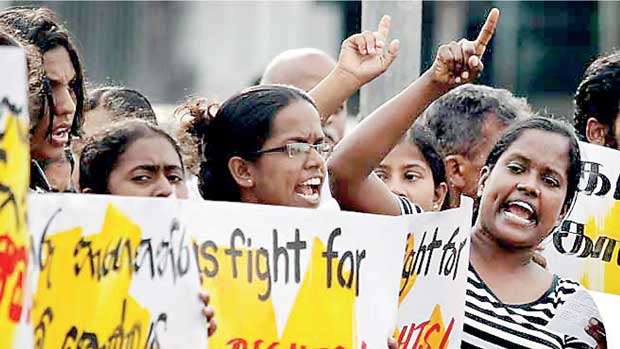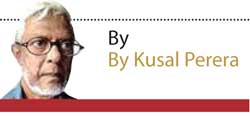Reply To:
Name - Reply Comment
Last Updated : 2024-04-20 00:00:00

A few days ago I was asked: “What are the biggest takeaways from Sri Lanka’s recent Local Government Elections?”
Answering Writer-Consultant Taylor Dibbet from Washington DC for the professional website Medium.com, I had two things as takeaway I said.
One, the MPs have been exposed persons as who did not know what they were expected to perform and where.
Two, the Colombo-based, pro-Government middle-class is clueless in reading the unfolding political crisis and still believe a “Rajapaksa bogey”  can save them. They don’t understand that this free-market economy does not allow anything else other than a tragicomedy.
can save them. They don’t understand that this free-market economy does not allow anything else other than a tragicomedy.
In this widely opened, free-market economy with corruption and fraud as inherent and permanent factors, these ‘circuses’ are what replace serious politics.
In this circus, there is no possibility whatsoever to ensure a corruption-free Government whatever political party the voters elect, unless these free-market neoliberal politics is completely given up. The other major issue is that Neoliberalism cannot survive without majoritarian extremism.
Sri Lanka, under Rajapaksa and also under Sirisena-Wickremesinghe runs with Sinhala Buddhist Extremism; India under Modi with Hindutva Dominance, Myanmar now with Aung San Su Kyi cultivating their brand of violent Buddhist Extremism, Pakistan and Bangladesh with Islamic Fundamentalism, is how Neoliberal Economies are sustained.
There is a political necessity for such racism in Neoliberalism. Neoliberalism is not a development model with socioeconomic and cultural contributions in improving quality and standard of human life.
It is city-centric with a large-scale accumulation of income and wealth in main cities.
It breeds a new middle class that plays the ‘insatiable consumer’ in cramped up, towering major cities.
Cities with massive multi-storey apartments and condominiums, modern sophisticated private hospitals with expensive comforts, neatly sutured with numerous health packages, large shopping complexes with glittering digital hoardings, selling designer stuff from sport shoes to lingerie, cosy luxury restaurants and hotels serving food from Chilean Curanto to Cantonese Chow Mein and adjoining car parks with valet service; all offered to the growing urban middle-class and to the new filthy rich and not to village life that has no consumers with buying power.
Ever since we opened up our economy 40 years ago, rural society has been left out of economic life.
Since 1978, over 19 State sponsored Integrated Rural Development Programmes (IRDPs) in about seven districts (N-E left out) with heavy donor funding and extended phases have not provided anything significant to rural life.
They don’t get integrated and cannot be integrated into this free-market economy that is essentially export manufacture trade and exclusively service oriented for urban life.
In rural life, while paddy cultivation remains the main subsidised occupation, the agrarian sector has not been modernised in productive terms.
Even tea and rubber industries have not been developed as modern industries with subsidiaries around them for more and better value addition.
The whole of the rural society thus lived with the large pay packet the young soldiers brought home once in three months till the war was concluded and for now remains with remittances from the Middle East, the toiling young women send home and the meagre savings the female workers send from sweatshop factories.
Over the decades they created a small consumer society, with communication centres, three-wheeler taxies, the random wayside tea kiosk turned into crude Chinese eateries and small consumer stores, selling light cosmetics and cheap imitations of Colombo fashion wear.
This had two evil side effects.
One, it made youth search for quick money for a fast consumer life, never mind how.
This allowed drug peddling and increased domestic migration with youth trekking to Colombo and suburbs in search of whatever livelihood possible.
From the Central Bank of Sri Lanka to the Colombo Stock Exchange, the Employees’ Provident Fund (EPF), Ministry Administrators, Auditors, Accountants, Valuation Officials, Legal and even Prosecuting officers, prove they are queued up one after another for high profile assignments
Two, it allowed for politicising of local life leading to a lawless, corrupt rural society. With that, two things grew quite fast. One was illegal to trade and business sidestepping law enforcement with political patronage and two, increase in sexual abuse of children, rape of women and underage marriages.
All that taken together- with rural dependency-breed frustration and an Anti-State feeling.
Though Colombo political advisors could not read this growing frustration and Anti-State feeling in rural society, it was evident against Rajapaksa at the 2014 September Uva Provincial Council elections and as a repeat at the 2015 Presidential Election too, though the Colombo middle-class believe it was their anti-corruption and good governance campaign that defeated Rajapaksa.
It was again evident with the just concluded LG Elections with the entire rural society voting against the Sirisena-Wickremesinghe National Unity Government, though the Colombo middle-class still wants to believe it is inaction against corruption that defeated their Yahapalana Government.
With no answers to any of these multiple issues that are there making, after all, the filthy rich with the urban middle class is compelled to find a political answer to keep this melting rural society under wraps.
That is how majority extremism finds validity in Neoliberalism. The majority ethnoreligious population in the marginalised rural society is provided with a dominant patriotic platform for the big city middle-class and the filthy rich to decide political power without any call for a change of system.
Their call remains for reforms in governance with promises to eradicate corruption. Reforms that have been proved bitterly unsuccessful, if not before, then with this much fancied ‘2015 Rainbow Revolution’.
With urban professionals, who keep chasing after big money with no morals and ethics of how they earn and live as privileged high-end consumers, the free-market economy is not an issue they would want to discuss, even in the face of further militarization of society.
For them, the remedy is to punish those politicians found corrupt. High-level professionals without whom there can be no corruption can also be punished if found guilty and replaced with ‘better ones’.
In this “open for fraud and corruption” system professionals are there to be hired for big money.
From the Central Bank of Sri Lanka to the Colombo Stock Exchange, the Employees’ Provident Fund (EPF), Ministry Administrators, Auditors, Accountants, Valuation Officials, Legal and even Prosecuting officers, prove they are queued up one after another for high profile assignments.
Thus. there is no “course correction” possible within this ‘incredibly free’ market economy. There is only one option available now in bringing back decency and dignity to human life:- In removing the disparity in quality of life and in the accumulation of wealth and income.
Free-market economy with corruption and fraud as inherent and permanent factors, these circuses are what replace serious politics
That is to replace this ‘free’ market Neoliberal Economy with an efficiently regulated market economy within a National Policy for socio-economic and cultural development.
An economy with ‘calculated market regulation’ is not going back to that pre-1977 economy with strictly rationed essential consumer items and a market with Police barricades.
That closed-door economic model with rations was as bad as this unrestricted free-market economy that left 70 percent of the population in rural society on the fringe.
That again does not mean the pre-1977 controlled economic model must be shunned as ‘failed’, to live with this free-market economy that has also failed, purely because there is no tested and proved economic model that could be adopted with assured success.
Successes, if any, can be continued with social consent. What we need to learn is, how we could design and engineer our own new model from our past failures.
Within a seriously thought out National Policy for Socio-economic and Cultural Development, the pre-1977 closed-door economy had many aspects that could be remodelled and built into a market economy.
There were many industries in which the State held total monopoly without space for the private sector.
Ceramics and Kelani tyres were two such monopolies. With all imports banned, they had no competition and the consumer had no choice. They existed without new technology and expertise for improving quality, designs and appearance.
It would have been different if the Government allowed market competition in those areas with local investment promoted for competitive production, packaging and marketing.
If import substitution was promoted not through banning, but through tax schemes and an imposition of CESS, that could have been used to promote these local products with incentives for quality improvement to match international markets.
In the agriculture sector too, there is market space to develop subsidiary industries around many crops like tea, rubber and rice.
Paddy cultivation can have a subsidiary industry with processed rice in neatly and hygienically packed retail form in addition to the traditional raw form we still continue with.
We are yet to develop a subsidiary industry to produce more than a dozen rubber-based products that are needed for the automobile industry, locally and internationally.
There are urgent needs and much space for serious thinking to plan the economy within an inclusive “National Development Policy”.
Education, health, public transport and housing can be planned and executed on a level playing field with equal opportunities within such a national development policy and a programme. A programme that would demand re-democratising of society with devolved powers to provinces.
It is a paradigm shift that can replace this extremely exploitative, largely discriminating free-market economy that is inherently corrupt and racist.
It is an alternative in every sense with a functional democracy that ensures economic freedom and social equality with human dignity. That remains the only option for a decent and dignified future that no Rajapaksa bogey, no reforms and course correction can provide even short-term answers for within this heavily exploitative and indecent free-market economy.
This political circus leading to a prolonged crisis the LG elections threw up, demands nothing else.

Add comment
Comments will be edited (grammar, spelling and slang) and authorized at the discretion of Daily Mirror online. The website also has the right not to publish selected comments.
Reply To:
Name - Reply Comment
On March 26, a couple arriving from Thailand was arrested with 88 live animal
According to villagers from Naula-Moragolla out of 105 families 80 can afford
Is the situation in Sri Lanka so grim that locals harbour hope that they coul
A recent post on social media revealed that three purple-faced langurs near t